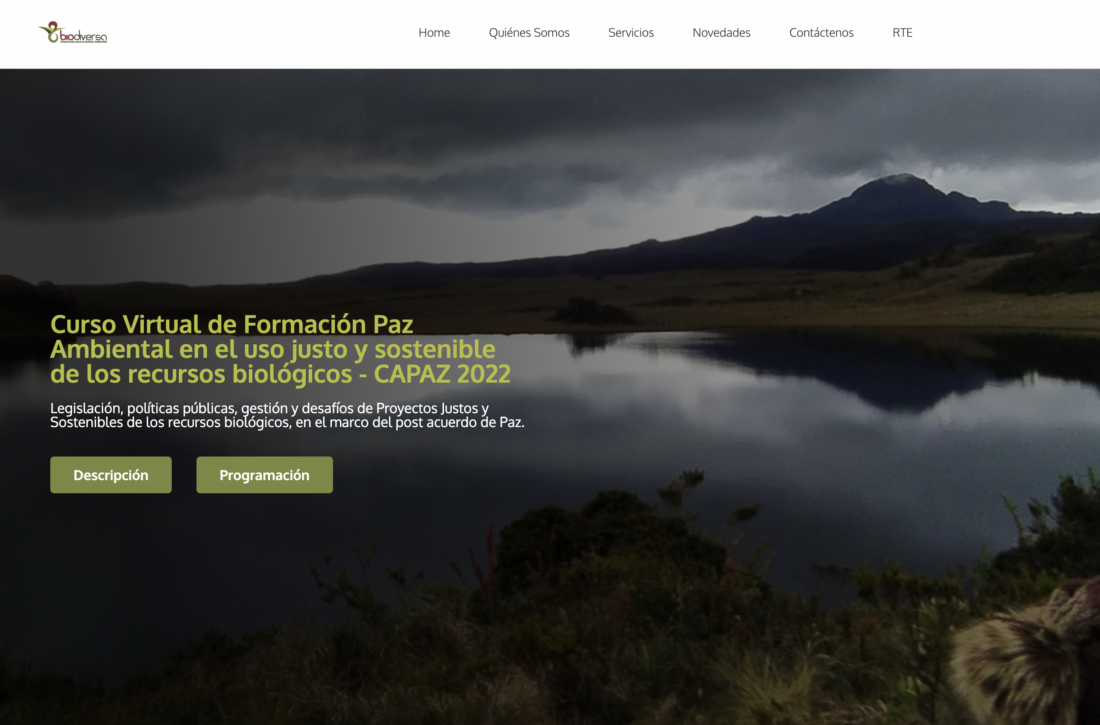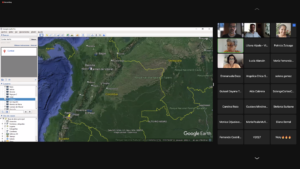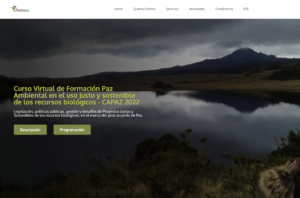
CAPAZ and Corporación Biodiversa’s free course on environmental peace begins
Tuesday, February 15 saw the opening session of the “Online Environmental Peace Training Course on the fair and sustainable use of biological resources – CAPAZ 2022”. This course is a joint effort with Corporación Biodiversa for participation and discussion on environmental justice and peace, with people working in different organisations or living in different grassroots communities around the country. The course is part of the ColombiaCONNECT project, with CAPAZ leading the environmental peace sector.
Several of the topics that were discussed in the First ColombiaCONNECT Interdisciplinary Workshop (held in October 2021) will be included in the course, and several of the speakers of the workshop will also be professors on the course.
 The launch
The launch
The coordinators and directors of the partner institutions, such as the coordinating team from Biodiversa formed by Santiago Sierra, José Silva, and María Claudia Buitrago, welcomed the participants during the opening ceremony.
Santiago Sierra is the director of Coorporación Biodiversa. He stated that “Biodiversa is a non-profit organisation that has been working in western Colombia for over ten years. We are a group of mainly biologists who started working together in a process of prior consultation, creating Biodiversa in the Colombian Pacific.
We also started to work on the issue of protected areas in Valle. We realised that declaring the areas as such is not enough for the transformations that are taking place. We found clues on how to strike a balance between conservation and local development, looking for strategies between economic, social, and governance aspects. It was from this perspective that we agreed to partner with CAPAZ to build this course together.
“This is a great opportunity to get to know each other and to continue building, as CAPAZ has sought to do, between academia, local projects, and communities. This articulation is very powerful and we are very proud to be part of this experience”.
Meanwhile, CAPAZ Academic Director, Prof. Dr. Stefan Peters added that “at CAPAZ we have worked on and we are very interested in thinking about the issues of environmental peace. The ColombiaCONNECT project, which focuses on the sustainable and fair use of bioresources, has led us to ask ourselves several questions. First of all, what is sustainable? What do you, me, or any community understand by sustainability? This can be very different for each of us, and the same goes for what fair means.
“We can have many academic discussions on the subject, but if we do not engage with the community, it is a strange discourse because the subject of biodiversity in Colombia is so broad that it can mean very different things in each region. So, more than something academic, it is a challenge to discuss. Justice, yes, but what kind of justice?”
He also added that the issue of the environment as a subject of rights in Transitional Justice is a topic that has occupied several of CAPAZ’ projects.
Find out more: La Lupa chapter 1 “Sentence to conscience? Biocultural rights in Colombia”
Find out more: Colombia+20 column “Nature as victim”
“The signing of the Agreements did not guarantee an improvement of the environmental situation. If we think about fires or deforestation, these are natural disasters, yes, but they also represent a challenge for the people who live there in harmony with the forest. So, such issues relate to nature, but also to socio-environmental issues that need to be addressed together with the communities”.
 Los/as profesores/as
Los/as profesores/as
The professors
Part of the introductory session was dedicated to presenting the professors who will teach the different modules of the course. They include:
- Santiago Sierra: BA in biology with mention in Ecology from Universidad del Valle, MA in Nature Management and Conservation from Universidad de Cadiz. With 20 years of professional experience, his main interest in the conservation of biodiversity through different strategies with the participation of local communities.
- Diego Cagüeñas: BA in anthropology and philosophy from Universidad de los Andes. PhD in anthropology and historical studies from The New School for Social Research. Professor at the Department of Social Studies, Universidad Icesi.
- Claudia María Buitrago: BA in law from Universidad de Caldas; Specialist in Juridical-Political Institutions and Public Law, Universidad Nacional de Colombia. MA in Political Science, Universidad de los Andes; partial studies for a PhD in Environmental Sciences, Universidad del Valle.
- Gustavo Mindineros: BA in business management, with two master’s degrees, one in development management and leadership and the other in sustainable agribusiness and inclusive markets; leader of the Cortepaz organisation, member of the team that promoted the associative marketing strategy in Tumaco from the regional cocoa council.
- Andrés Osorio: BA in civil engineering, with an MA and PhD in Marine Sciences and Technologies. A professor at Universidad Nacional de Colombia, he also directs the research group in oceanography and coastal engineering, OCEANICOS (Category A1 in Colciencias). He is currently serving as the director of the Centre of Excellence in Marine Sciences – CEMARIN.
- Liliana Paz: BA in ecology and PhD candidate in Environmental Sciences at Universidad del Cauca. Protected Areas and Climate Change Coordinator for the Ecohabitats Foundation.
- Paulo Ilch Bacca: Legal ethnographer with a degree in law from Universidad Nacional de Colombia and a PhD in socio-legal studies from the University of Kent in the United Kingdom. He currently directs the Ethnic and Racial Justice line at Dejusticia and is a professor of legal theory at Universidad Javeriana.
- Camila Bernal: Researcher at the Humboldt Institute, currently part of the team implementing the project “NariñoBio: Design and testing of a social innovation strategy for scientific nature tourism in the ancestral Awá territory of the Department of Nariño”.
The students
The students are very diverse, with people connecting to the classes from Pasto, El Carmen de Viboral, Jamundí, Marinilla, Leticia, Bogotá, and Ibagué. Initially, there was room for 25 students, but having interviewed those interested, the coordinators realised that the group was so diverse and their work so interesting, that they expanded the quota to 40 people. Participants include individuals from grassroots communities, from the academic sector, and public sector workers.
Find out more about the course, its structure, and its methodology.



